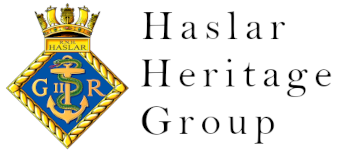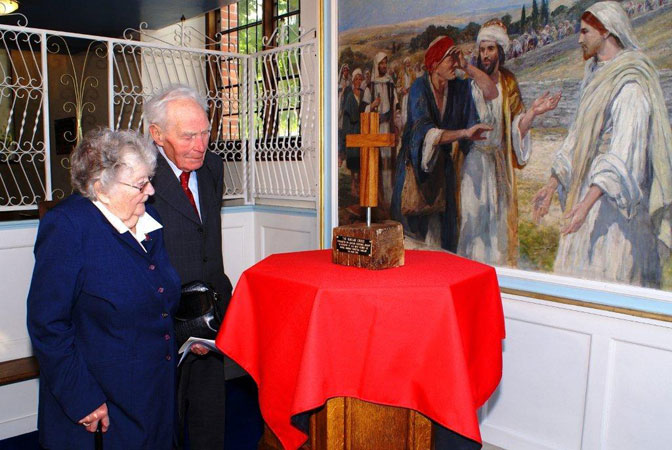World War 2 Recollections of Haslar - Sylvia Bell VAD
Originally presented at Gosport Discovery Centre on 8th March 2007.
by Sylvia Bell, VAD (Haslar).
Editor: Sadly Sylvia Bell passed away in October 2016 aged 96
It is difficult to equate today’s Haslar with that of 63 years ago and even more difficult to remember details of those days. Soon after moving here twenty years ago, I went to visit my husband in Haslar. I declined the offer of guidance by the chap at the gate, ignored the map on display – – – and found myself in the kitchens, So much for memory!
Perhaps I should explain the title “VAD”. One definition was, “Very Attractive Damsel”. Other less respectable explanations – popular with the Navy – took the ‘*V” to stand for “Virgin” leading to all sorts of ribald interpretations. In fact the letters’ VAD” actually stands for “Voluntary Aid Detachment”.
This organisation was formed in 1909 to provide addition of nurses in time of war and was staffed by volunteers from the Red Cross, St Johns and St Andrews. Some 5000 of us served with the Navy in WWII, in hospitals at home and abroad and in hospital ships. Many of us spent at least part of our time in Haslar.
At the outbreak of war I was already working in London for the Australian Government and became much involved with the supply by convoy of essential Australian products to the UK. In my “spare time” I was a part time Air Raid Warden
But from my days as a Girl Guide when I had filled one arm with first aid and nursing badges – I had wanted to nurse so any other spare hours were spent as a Red Cross volunteer in the local hospital. I never needed sleep in those days! Nursing seemed to be an endless round of bed-pans – thirty two beds in a female ward filled with air-raid victims and the sick. Matron didn’t think it seemly to put a young female onto a male ward so when, at last, I obtained my release from Australia House and was posted to Haslar, shortly before D Day, a ward full of young men was a bit of a challenge. But at least I was used to the wounds of air raid victims and these were not unlike the wounds sustained in battle.
VAD’s bought their own uniform that included a great coat, a walking out suit, shirts and hat, two nursing dresses, seven aprons, cuffs, caps and all the rest. We were paid £10 a month from which a sizeable amount was deducted for messing.In many respects we were treated as officers and enjoyed the privilege of first class travel on the railways. But we were not allowed in the wardroom unless we wore civilian clothes which most of us did not have with us, being limited to one peg for all our gear. No one seemed to know the origin of this strange rule but it did give the Queen Alexandra sisters a clear run” and some VAD’s were inclined to suspect that it was they who lay behind the restrictions.
I eventually arrived at Portsmouth harbour where no pinnace was available so I, with another new recruit, crossed by ferry, caught a bus to Haslar and lugged our cases to the VAD quarters in D Block. We were standing in the hall wondering what to do next when a stentorian voice boomed from above, “What are you doing down there? Come up immediately.” I felt about five years old and nearly ran back to London; bombs seemed the lesser evil. This was our introduction to “Madam Miss Waistall. she was Commandant of the VAD’s and ruled with a rod of iron, Heaven help anyone found with a trace of lipstick, or arriving late in quarters, not having signed in. But behind the fierce exterior was a heart of gold and she never failed to look after our interest and our welfare.
When, after D Day, some of us were invited onto a submarine for a trip round the harbour, her advice was, “Be sure to wear knickers with elastic in the legs”. Good advice – I had never seen so many upturned faces at the bottom of a ladder. Her job could not have been easy, VAD’S were from all walks of life; professional artists, landed gentry, the middle classes and families that, nowadays, might be described as “deprived”. But class didn’t seem to matter and, by and large, we got along famously. Unlike today’s youth, many of us were remarkably “innocent”.
One of our numbers recorded how, after settling a French soldier into bed, she unpacked his kit bag and spilled a packet onto the floor, remarking to a nearby SBA (Sick Berth Attendant), ‘Why does he need so many finger stalls?” The SBA quietly led her aside and explained the mysteries of contraception. Officially, we were not allowed to fraternise with SBA’s but, inevitably, there was a surprising number of romances.
One of my friends who was prone to talking in her sleep once woke us all by flinging her stone hot water bottle across the room exclaiming, “No Fred. No, that’s enough”. Fred was an SBA! They later married and lived happily ever after!
Back to my first day! Because the VAD quarters in Haslar were overcrowded we were sent to a requisitioned girls’ boarding school called Ambleside – now a block of flats – in The Crescent, The Crescent was known locally as Admirals’ Row but the accommodation we enjoyed would not have impressed any Admiral – not even Nelson. Thirty girls shared one bathroom containing a bath, a washbasin, a sink for washing clothes and an ironing board. At least there was a separate loo! Of course, no one was allowed to lock the bathroom door and it was thus that I learned that one of our colleague’s was averse to washing, when she did; the tidemark above her collar had to be seen to be believed, and her elegant legs were spattered with black spots where she had concealed holes in her stockings with ink. Not one of Madam’s favourites – but she was great fun!
However, and back to me, our first job on arriving was to erect our iron bunk bed. A bit like assembling a piece of flat pack furniture without instructions – even in Chinese. When we eventually climbed in we tried hard to lie absolutely still in case any movement caused the bunk to collapse and that it did – as we were climbing out next morning.
Madam’s rule did not extend to the wards where we were ruled by the
Queen Alexandra sisters. We were all under intense pressure and it would be unreasonable to expect that all would be sweetness and light!
Some QA’s understandably became impatient with our mistakes and this was of some concern because their assessment was a key factor in our gaining promotion to Senior VAD and raising our pay to £12 a month – less
Mess fees, of course!
In my own experience problems were quickly smoothed over and
was soon forgotten And, as for the patients, I could record a string of romances between them and VAD’s – but I’ll keep quiet.
What we did have to accept was a good deal of risqué observations
which, nowadays, might well be called “sexual harassment” and result in courts awarding huge sums in compensation. We just gave back as good as we got and had a laugh, There were, of course, some very sad moments. My own enduring memory is of a very young 18-year-old Welsh soldier just after D Day. his body was so shattered that he had to be suspended in a specially constructed hammock. He knew he was dying but his only concern was that his widowed mother should have a pension. I assured him would try for him and I only hope she did. At least he died at peace.
The pressure on the hospital after D Day was enormous, with patients of every nationality – including German – plus all three of our own Services. We were extremely busy and not allowed to leave the hospital except by back roads to our quarters. But, when off duty, we climbed the wall on the seaward side – in those days the wall was as high as itis now in Dead Man’s Mile, though not festooned with barbed wire. From there we could see the ships bringing back the wounded. When at last we were allowed to walk along Stokes Bay we were amazed to find the beach covered with grape fruit skins. Who on earth could have authorised the transport of such luxuries when we were so short of essentials?
But I suppose we couldn’t deny the Yanks even if we hadn’t seen a grapefruit since 1939. With so much tiring work and so much sorrow it was essential that we could enjoy some degree of recreation and the dances and shows in the Errol Hall were very popular. I particularly remember Bud Flanagan giving a show to express his appreciation of the way in which we had nursed his son. Portsmouth, and even Gosport, offered a wider range of entertainment but were accessible only with a late pass – 11pm. This sort of expedition usually involved walking in the blackout – something I would not do now though I never
experienced trouble then, nor did I hear of anyone else being molested- Otherwise, we could always stay at home and try our luck with the solitary sink and a load of smalls Or take a bath before the hot water ran out!
I left the VAD and Haslar in 1946, taking with me a host of memories and experiences that I still treasure. The pallor of the VAD’s working in the underground operating theatres. Moving patients down to the basements on red alert – though you didn’t get any warning of Doodle Bugs which were prevalent around D Day. I remember, too, missing the pinnace and having to run over Pneumonia Bridge and through Gosport’s narrow streets to the open decked ferry, and then, on the other side, running from the pontoon to the Harbour Station
to catch the London train. On a weekend pass every hour was precious, and I will not forget the Navy bikes issued to us – dreadfully heavy and lacking a freewheel facility. The only way you could rest your legs coming downhill was to lift your feet from the pedal altogether’ The problem was to restore them to their rightful place without skinning ones shins!
There were tragedies and tears. There were jokes and laughs. But, throughout it all, there was the wonderful sense of comradeship – which still exists in our Association today. (Sadly the association is no more as it was disbanded some years ago when numbers fell and members passed away.)
Vera Britain, author of “Testament of Youth” and mother of Shirley Williams Labour Peeress, who was a VAD in the First World War. For me, she summed up my time at Haslar in a short poem which reads:
A mass of human wreckage drifting in,
Borne on a blood-red tide,
Some never more to brave the stormy sea
Laid reverently aside.
And some, with love, restored to sail again
For regions far and wide”
After the war our VAD Association published a book of individual memories entitled:
‘We Were There”
I’m glad I was.
Sylvia Bell (nee Feetey) Senior VAD (RN)


